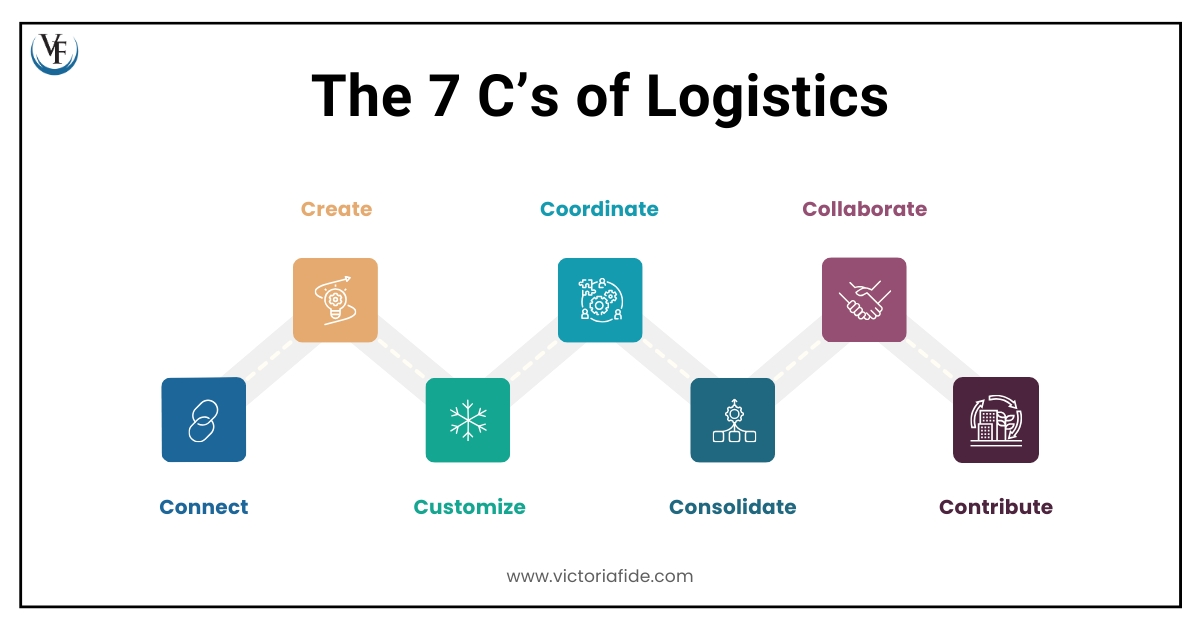
As professionals in the logistics industry, we understand the complexities and challenges of managing the flow of goods and services in today’s fast-paced, interconnected world. Over the years, the industry has evolved and adapted to meet these challenges, leading to the development of numerous strategies and frameworks. One such framework we find particularly valuable is the “7 C’s of Logistics” concept.
The 7 C’s — Connect, Create, Customize, Coordinate, Consolidate, Collaborate, and Contribute — represent a holistic approach to managing logistics processes. Each of these elements plays a unique and critical role in enhancing our operations’ efficiency, reliability, and sustainability.
In the hyper-connected world of 2023, the 7 C’s are more relevant than ever. The logistics landscape has become increasingly complex due to rapid technological advancements, changing consumer expectations, and the ongoing effects of global events. As a result, logistics professionals must be proactive, adaptable, and innovative in their approach.
Looking to Optimize Your Business Processes?
Check out our Business Process Optimization services or contact us to find out more about how we guarantee business results with digital transformation.
The Power of the 7 C’s Framework
Table of Contents
1. Connect
The first C in the framework involves establishing strong relationships with various stakeholders — including suppliers, customers, and partners — to ensure a seamless logistics process. With the digital revolution, the ability to connect instantly and effectively across the globe is a game-changer.
In our daily operations, we must foster robust connections with all our stakeholders to thrive in the logistics industry. This includes maintaining open lines of communication with our clients to understand their needs, building solid relationships with our suppliers to ensure reliable service, and collaborating effectively with our partners. In the digital age of 2023, this extends to leveraging modern communication tools and platforms to stay connected.
Emerging Technologies for Connection
The digital revolution continues to redefine the ways we connect. Emerging technologies such as 5G and the Internet of Things (IoT) promise to further enhance our ability to communicate and collaborate with stakeholders in real-time from anywhere in the world. As we move forward, we’ll need to leverage these technologies to stay connected in an increasingly digital and decentralized global marketplace.

2. Create
Innovation is key in an era where new technologies and business models are constantly emerging. We strive to innovate and develop effective systems and processes to address the dynamic needs of the market.
Innovation is at the heart of what we do in our day-to-day operations. We constantly seek to create more efficient and effective ways to manage our logistics processes. This involves staying current with the latest industry trends and technological advancements, and being bold in thinking outside the box and experimenting with new ideas.
Looking to the Future
Artificial intelligence (AI), machine learning, and advanced data analytics are opening new avenues for creativity and innovation in logistics. These technologies can help us predict market trends, optimize logistics processes, and automate decision-making. Embracing these tools will be essential for staying competitive and creating value in the future logistics landscape.
3. Customize
Customization is all about tailoring our services to meet each client’s unique needs and expectations. As consumer expectations evolve, so does the need for personalized, flexible services.
Every client is unique, and so are their logistics needs. We take the time to understand each client’s specific requirements and tailor our services accordingly. This can involve customizing delivery schedules, offering flexible pricing models, or even developing specialized solutions for handling specific types of goods.
Keeping Pace with Evolving Customer Expectations
With the rise of e-commerce and changing consumer expectations, customization will become even more crucial. Technologies like AI and big data will allow us to understand our customers on a deeper level and offer personalized services at an unprecedented scale. Additionally, the rise of additive manufacturing (3D printing) could enable us to customize physical goods in ways that were previously unimaginable.

Transformation is not easy, but it doesn’t have to be impossible. Take control of your project’s success today and schedule a free 30-minute consultation to find out how Victoria Fide can equip you for transformational success.
4. Coordinate
Coordinating complex, multi-tier supply chains has become an absolute necessity. This involves efficiently managing and synchronizing various logistics activities to ensure smooth operations.
Successful coordination of complex logistics requires meticulous planning and organization, as well as the use of advanced logistics management systems. From coordinating supply chain activities to managing warehousing and transportation, we strive to ensure that all parts of our operation work together seamlessly.
Revolutionizing Supply Chain Management
As supply chains become more complex and globalized, coordinating logistics operations will be an ever-greater challenge. Fortunately, technologies like blockchain could revolutionize supply chain management by providing a secure, transparent platform for tracking goods and transactions across multiple parties. Similarly, AI and machine learning can help us manage and coordinate operations more efficiently.

5. Consolidate
Consolidation focuses on streamlining processes, reducing costs, and improving efficiency by bringing together resources and operations. In the face of growing competition, this can lead to significant cost savings and efficiency gains.
Organizations wanting to achieve greater efficiency might consider consolidating shipments to reduce transportation costs, integrating various logistics services to provide a one-stop solution for their clients, or merging operations with other companies to leverage shared resources and capabilities.
Seeking Opportunities for Consolidation
As competition intensifies, consolidation will continue to be an essential strategy for reducing costs and improving efficiency. In the future, we may see more mergers and acquisitions in the logistics industry and increased use of shared platforms and resources. Furthermore, autonomous vehicles and drones could help us consolidate deliveries and reduce transportation costs.
6. Collaborate
Collaboration is vital to leveraging shared resources, knowledge, and capabilities to achieve common objectives and greater competitive advantages.
This synergistic cooperation is key to success in the logistics industry. By working with our partners, suppliers, and competitors, we can pool our resources and expertise to develop better solutions and achieve common goals. This could involve collaborating on joint ventures, participating in industry forums, or sharing best practices.
The Role of AI and Collaboration
Collaboration will take on new dimensions in the future. We expect to see more collaborative partnerships not just between companies but also between humans and machines. For example, AI and robotic process automation (RPA) could take over routine tasks, freeing human workers to focus on more strategic and collaborative activities.
7. Contribute
Lastly, we aim to contribute positively to our industry, society, and the environment through our logistics operations. In a world increasingly aware of environmental and social issues, making a positive contribution is not just good ethics – it’s good business.
This could mean adopting sustainable practices, contributing to industry research and development, or participating in community initiatives. In the long run, this benefits society and contributes to our business’s sustainability and success.
Working Toward a Sustainable Future
Sustainability is becoming an increasingly important concern for businesses and consumers alike. As a result, contributing positively to the environment and society will be more critical than ever. This could involve adopting greener transportation methods, using renewable energy sources, or participating in circular economy initiatives.
Navigating the Future of Logistics
The 7 C’s provide a guiding framework that allows us to navigate the complex world of logistics in our daily operations, and will remain a crucial framework for logistics professionals in the future. However, as technology continues to evolve, we will need to adapt and innovate to keep applying these principles effectively. Regardless of what the future holds, we’re confident that the 7 C’s will continue to guide us toward success in the ever-changing world of logistics.
About the Author
Shana Gibbons is the Warehousing and Supply Chain Business Process Consultant. She has over 16 years of experience working in the Supply Chain and Warehousing space, and she is deeply passionate about building relationships with her clients and teams in order to help them navigate through their Warehouse and Supply Chain ups and downs.
